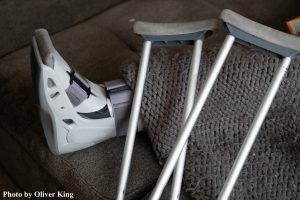 Recently, a Texas district court issued an opinion in a lawsuit stemming from injuries a man suffered during a workplace altercation. According to the record, the plaintiff worked in a storeroom of a clothing store that is operated by a larger company. The plaintiff and another employee became involved in a verbal altercation requiring intervention from a supervisor. The supervisor presented the parties with the options to either quit their jobs, change shifts, or continue working together-they chose to continue working together. About a week after the verbal altercation, the men became involved in another argument, and the employee punched the plaintiff. Both of the men were terminated from their positions. The plaintiff filed a lawsuit against the parent company, arguing that they were liable for his injuries because of negligent hiring, negligent training, negligent supervision, retention, and monitoring. A jury found in favor of the plaintiff, and the company appealed.
Recently, a Texas district court issued an opinion in a lawsuit stemming from injuries a man suffered during a workplace altercation. According to the record, the plaintiff worked in a storeroom of a clothing store that is operated by a larger company. The plaintiff and another employee became involved in a verbal altercation requiring intervention from a supervisor. The supervisor presented the parties with the options to either quit their jobs, change shifts, or continue working together-they chose to continue working together. About a week after the verbal altercation, the men became involved in another argument, and the employee punched the plaintiff. Both of the men were terminated from their positions. The plaintiff filed a lawsuit against the parent company, arguing that they were liable for his injuries because of negligent hiring, negligent training, negligent supervision, retention, and monitoring. A jury found in favor of the plaintiff, and the company appealed.
Among other issues, the company argued that they were not liable because the men were not employees of the parent company, but rather of a subsidiary. The company argued that the plaintiff did not establish that the defendant had an employment relationship with any of the parties involved, or that they controlled the subsidiary’s safety policies. Therefore, the jury’s finding was not supported by the evidence.
Under Texas laws, the court will sustain a sufficiency of the evidence challenge if there is a complete absence of an essential fact, the trial court is barred by the law to give weight to the evidence offered to prove a vital fact, if the preferred evidence is no more than a “mere scintilla,” or the evidence established the opposite of a vital fact. Evidence rises to a sufficient level if it would allow fair-minded people to differ in their conclusions. Further, if the evidence does not create more than a slight suspicion, it is not sufficient.
 Texas Injury Lawyers Blog
Texas Injury Lawyers Blog


 We’ve all been there—after a long day at work, or on the way to work, you find yourself fighting to keep your eyes open to focus on driving. In Texas, where most people own a car and driving is a regular part of getting around and commuting, Texas drivers are especially susceptible to these accidents because of how much time is spent on the road. Whether it was stress from the day or a restless night of sleep the night before, drowsy driving is dangerous and can often lead to fatal consequences. Unfortunately, Texas drowsy driving accidents are more common than you may expect.
We’ve all been there—after a long day at work, or on the way to work, you find yourself fighting to keep your eyes open to focus on driving. In Texas, where most people own a car and driving is a regular part of getting around and commuting, Texas drivers are especially susceptible to these accidents because of how much time is spent on the road. Whether it was stress from the day or a restless night of sleep the night before, drowsy driving is dangerous and can often lead to fatal consequences. Unfortunately, Texas drowsy driving accidents are more common than you may expect. Sometimes, unexpected things happen while driving, and pulling to the shoulder of the road is your only choice. Staying parked on the shoulder of the road, however, can be dangerous. Cars that drift out of their lanes can collide with your car, or worse, crash into you as you are attending to your vehicle. When these accidents occur, the thought of filing a San Antonio personal injury claim may feel overwhelming. Indeed, the recovery process can be a complex one, and it is crucial that you know what is required in a Texas personal injury claim.
Sometimes, unexpected things happen while driving, and pulling to the shoulder of the road is your only choice. Staying parked on the shoulder of the road, however, can be dangerous. Cars that drift out of their lanes can collide with your car, or worse, crash into you as you are attending to your vehicle. When these accidents occur, the thought of filing a San Antonio personal injury claim may feel overwhelming. Indeed, the recovery process can be a complex one, and it is crucial that you know what is required in a Texas personal injury claim. Whether you’re sending your children to college for the first time as a parent or you’ve had an empty nest for a while, the start of an undergraduate career is often every bit as exciting as it is nerve-wracking. On the one hand, you’re proud of your kids for making it this far, but also nervous about what it’ll mean for them being on their own for the first time. However, no one ever expects to get bad news and hear that their children were involved in a major accident while away from home. When these incidents occur, those responsible can be held accountable through a Texas wrongful death or personal injury lawsuit.
Whether you’re sending your children to college for the first time as a parent or you’ve had an empty nest for a while, the start of an undergraduate career is often every bit as exciting as it is nerve-wracking. On the one hand, you’re proud of your kids for making it this far, but also nervous about what it’ll mean for them being on their own for the first time. However, no one ever expects to get bad news and hear that their children were involved in a major accident while away from home. When these incidents occur, those responsible can be held accountable through a Texas wrongful death or personal injury lawsuit. Many Texans spend the majority of their time at work. As a result, San Antonio
Many Texans spend the majority of their time at work. As a result, San Antonio  Because of social distancing requirements in the wake of COVID-19, people in Texas are taking advantage of shopping from the comfort and safety of their own homes. In addition, the ease and availability of all kinds of products through online retailers has made it possible to purchase everything from your family’s weekly grocery haul to the newest gadget. But when that package arrives on your doorstep, is the item you have received safe? Outside of the convenience factor of the shopping experience, can we trust online retailers and their products? If you are a Texan who has purchased a faulty product from an online retailer that has become a hazard or dangerous, you may be eligible to receive compensation through a product liability claim.
Because of social distancing requirements in the wake of COVID-19, people in Texas are taking advantage of shopping from the comfort and safety of their own homes. In addition, the ease and availability of all kinds of products through online retailers has made it possible to purchase everything from your family’s weekly grocery haul to the newest gadget. But when that package arrives on your doorstep, is the item you have received safe? Outside of the convenience factor of the shopping experience, can we trust online retailers and their products? If you are a Texan who has purchased a faulty product from an online retailer that has become a hazard or dangerous, you may be eligible to receive compensation through a product liability claim. Many people prefer motorcycles to cars because of the freedom associated with whizzing down the road. In addition to making your daily commute potentially easier and more fun, motorcycles can also offer an increased sense of mobility. However, a certain degree of risk comes with operating a motorcycle – without the steel exterior of a car to protect you on the road, you may be more at risk in the event of a serious accident. When an accident happens unexpectedly, especially if you are riding a motorcycle, the consequences may be drastic.
Many people prefer motorcycles to cars because of the freedom associated with whizzing down the road. In addition to making your daily commute potentially easier and more fun, motorcycles can also offer an increased sense of mobility. However, a certain degree of risk comes with operating a motorcycle – without the steel exterior of a car to protect you on the road, you may be more at risk in the event of a serious accident. When an accident happens unexpectedly, especially if you are riding a motorcycle, the consequences may be drastic. Everyone has heard a friend or loved one jokingly claim that everyone forgets how to drive when it rains. However, inclement weather or slippery and wet conditions can be a major danger to motorists, especially if there are many cars on the road. Every driver knows that when weather conditions are poor, driving with extra caution is crucial to ensuring your safety and the safety of others. Unfortunately, even with the utmost of caution, sometimes accidents inevitably happen.
Everyone has heard a friend or loved one jokingly claim that everyone forgets how to drive when it rains. However, inclement weather or slippery and wet conditions can be a major danger to motorists, especially if there are many cars on the road. Every driver knows that when weather conditions are poor, driving with extra caution is crucial to ensuring your safety and the safety of others. Unfortunately, even with the utmost of caution, sometimes accidents inevitably happen. For many, a car serves as the primary method of transportation on a daily basis. However, no matter how careful someone is while on the road or how skilled they are at driving, other motorists who do not follow the traffic laws pose a significant threat. When others are careless and cause accidents or even fatalities to occur on the road, those who are responsible can be held accountable for their actions through a Texas personal injury lawsuit.
For many, a car serves as the primary method of transportation on a daily basis. However, no matter how careful someone is while on the road or how skilled they are at driving, other motorists who do not follow the traffic laws pose a significant threat. When others are careless and cause accidents or even fatalities to occur on the road, those who are responsible can be held accountable for their actions through a Texas personal injury lawsuit.